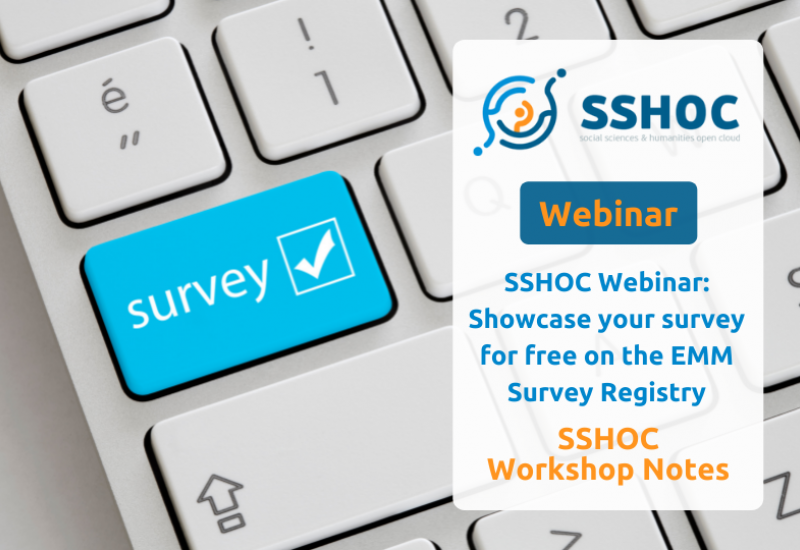
- Social Sciences & Humanities Open Cloud
SSHOC webinar notes: Showcase your survey on the EMM Survey Registry and explore the COVID-19 survey collection

Date:
02 November 2021
In spring 2020, SSHOC, in collaboration with COST Action 16111 - ETHMIGSURVEYDATA and the ANR project FAIRETHMIGQUANT, launched the Ethnic and Migrant Minority (EMM) Survey Registry, a free online tool that provides information (i.e. metadata) about quantitative surveys undertaken with EMM populations (primarily in Europe). While the EMM Survey Registry does not operate as a data repository, i.e. it does not store data, it offers users trustworthy metadata that has undergone a rigorous quality assurance process before publishing, allowing them to efficiently discover and identify surveys of interest. Moreover, the EMM Survey Registry represents a single access point to this quality information about the surveys, all of which need to meet strictly defined criteria to be included in this tool.
This tool, which attracts roughly 200-300 visitors every month, has already helped to improve the discoverability of and access to nearly 1400 surveys from 30 different European countries. To further grow and expand the already rich metadata collection of the EMM Survey Registry, Laura Morales and Ami Saji (both at Sciences Po) hosted a webinar on 20 September 2021 for data producers to illustrate why the EMM Survey Registry is an effective tool for showcasing their survey (about EMMs’ integration and/or inclusion) with an international audience for free, as well as when and how they can contribute metadata about their survey directly to the EMM Survey Registry.
This webinar, therefore, explored in detail:
- The user-friendly functionalities of the front-end of the EMM Survey Registry (i.e. the interface that enables users to explore the available metadata) that allow both researchers and policy-oriented professionals to easily locate surveys of interest to them. The front-end offers basic as well as multi-level advanced filtering options, keywords search, and access to abbreviated and full metadata which can be exported to the XML format.
- The success the EMM Survey Registry has already had in attracting an international audience, due to its expansive and diverse metadata collection. The EMM Survey Registry currently covers surveys from almost all of Europe and is continuing to expand, most notably from support from data producers. Moreover, despite its newcomer status, it is already well known even beyond Europe (90% of European users, 10% of users from other continents), which signals that it is providing a highly sought-after solution for sharing resources and information in the ethnic and migration studies data community.
- The steps data producers need to take in order to successfully contribute metadata about their survey using an online form made available via the back-end of the EMM Survey Registry (i.e. the interface where the metadata is being managed). The online form, which has been designed using a multi-step testing process involving different user communities, allows data producers to easily and intuitively provide metadata about their survey. All metadata that is contributed using the online form is rigorously controlled before publishing, ensuring that the EMM Survey Registry continues to provide quality information about the surveys covered.
- The newly launched COVID-19 collection of the EMM Survey Registry that is attempting to bring together and provide single point access to existing COVID-19 surveys undertaken with EMM respondents. By creating a dedicated and special collection, the EMM Survey Registry improves the visibility of these surveys, promotes the reuse of their data, and helps users access all relevant surveys all in one go. The ‘live’ collection can be accessed in the EMM Survey Registry by searching for the keyword COVID-19. Data producers are actively being invited to contribute to this collection (see infosheets in English, French, and Spanish) so this public resource can be as comprehensive as possible.
To learn more about this webinar and to catch the live demo of the back-end online form, check out the webinar recording and the slide deck.
Event Page
For further information about the EMM Survey Registry, please consult:
- The EMM Survey Registry’s landing page
- Video tutorials about the back-end of the EMM Survey Registry
- The Zenodo page of the ethnic and migration studies data community
- The Youtube channel of ethnic and migration studies data community
